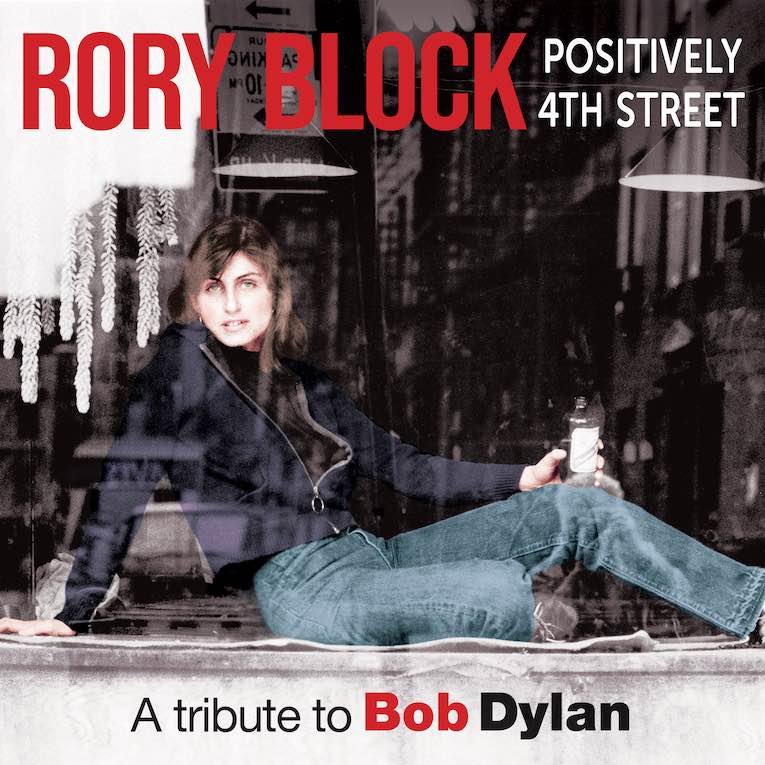
Review: Rory Block ‘Positively 4th Street – A Tribute to Bob Dylan’
By Jim Hynes
Seven-time Blues Music Award Winner and champion of traditional acoustic blues, Rory Block, has had Bob Dylan on her mind since she was ten years old. She literally grew up just two doors down from him on 4th Street in Greenwich Village. One might wonder why it took so long for the Dylan tribute. Maybe it felt just a little too close for comfort or more likely, Block didn’t want to stray from her many tributes to the blues pioneers. Yet, during the pandemic, when she and her husband, Rob Davis, streamed weekly shows from their home, her loyal, burgeoning fan base kept requesting Dylan covers. With the encouragement of her husband, her engineer, her fan base, and Stony Plain label owner Holger Peterson, she finally took the leap.
We’ll get to the music shortly, but Positively 4th Street – A Tribute to Bob Dylan project should be treasured as well for the exquisite liner notes, written by Block, some excerpted from her fine autobiography, When a Woman Gets the Blues – “I remember the hat, and youthful face. He was not yet famous, so at that point he was among the many interesting people stopping by [at her father’s Allan Block Sandal Shop] …After he left Dad told me something about the conversation. He said that Bob was a poet first and foremost who really didn’t care for “business” side of things. His priorities lay in being true to his art. Right away I resonated with the message.”
Block is a one-person band playing guitars, percussion, and drums except for the baritone guitar solo from her friend and soulmate, Cindy Cashdollar on “Not Dark Yet.” Block’s selection of songs is especially intriguing, spanning 58 years of Dylan discography. It would have been easier and natural to focus on his pure folk albums, say the first three from the early ‘60s that mirrored their time together in Greenwich Village. Also, she shied away from tunes often covered by other blues artists such as “Leopard Skin Pillbox Hat” or “It Takes a Lot to Laugh, It Takes a Train to Cry.” You can probably cite many others in a strictly bluesy structure. Block, though, has never been labeled predictable so in that sense we shouldn’t be surprised. She is certainly a far better guitarist than Dylan, and to most ears a far better singer too. Yet, it takes getting used to the differences in phrasing. Also, on the folk-rockers such as the title track and “Like a Rolling Stone,” this listener feels the conspicuous absence of Al Kooper’s organ and Mike Bloomfield’s electric guitar. Nonetheless, Block delivers these tunes with sincerity and deep emotion.
The album kicks off with two from Dylan’s 1989 Oh Mercy (produced by Daniel Lanois)– the opening track “Everything Is Broken” and Block’s released single “Ring Them Bells.” She confesses to identifying with some of the lines in “Like a Rolling Stone” as a teenager – “a complete unknown with no direction home” and “no secrets to conceal.” Throughout Block mixes her acoustic picking with slide, mentioning that that are very few overdubs, but certainly the percussion and the prominent drum rolls on the given title track are among those. Interestingly, “Positively 4th Street” never appeared on a Dylan album but was all over the airwaves as a single in 1965, (those halcyon days of transistor radios) sandwiched between his albums Highway 61 Revisited and Blonde on Blonde. “Mr. Tambourine Man” hails from Dylan’s 1965 Bringing It All Back Home, the album that marked his turn toward electric while the protest song (nuclear war at the time but perhaps relative to the climate crisis today) “A Hard Rain’s A-Gonna Fall” is from 1962’s The Freewheelin’ Bob Dylan, the album cover of which appears as a faint reflection in Block’s own cover photo.
“Mother of Muses” from 2020’s Rough and Rowdy Ways is an interesting choice as it’s from perspective of a modern man, in almost a gospel hymn fashion, the “Mother of Muses” from Greek mythology. Even more curious is her almost 21-minute version (Dylan’s was 17) of Dylan’s Shakespearian referenced title “Murder Most Foul” from the same record, one that like Dylan’s is more recited than sung. She could have easily elected to cover four or five additional songs in that time span, but she must have been taken with Dylan’s overriding message of how the assassinations of both JFK and Martin Luther King ripped the soul of America. Here is a link to Dylan’s full lyrics.
It’s long been said that other artists ‘do Dylan better than Dylan.’ Dylan fanatics may argue otherwise. Here is more fodder for that debate.
Listen to “Ring Them Bells”

Leave A Comment